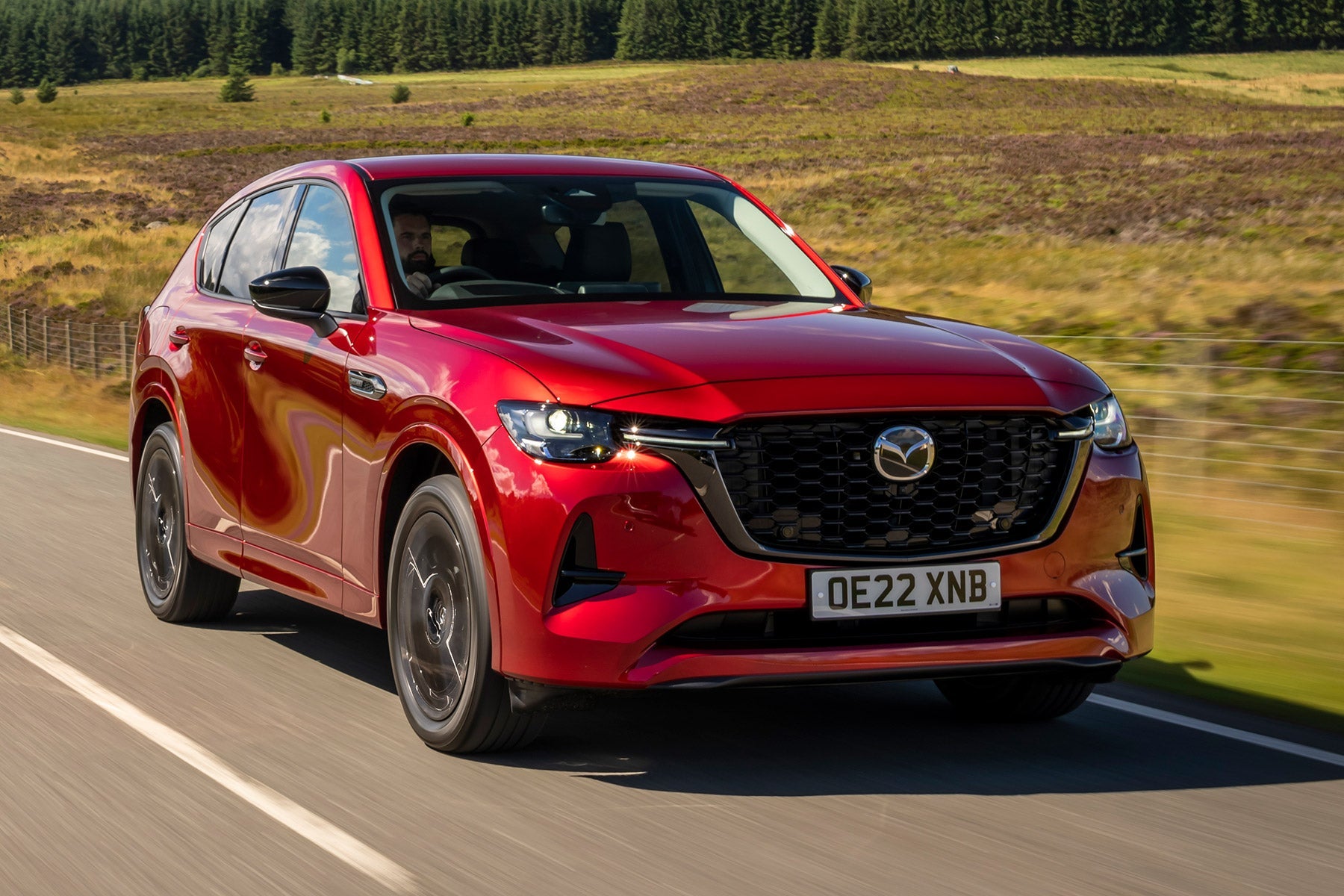Mazda CX-60 Review 2025: Price, specs & boot space
Written by Andrew Brady
Quick overview
Pros
- Looks pretty swish
- Interior is lovely (even on the most affordable models)
- Cheaper to buy than an Audi Q5
Cons
- Some buyers would prefer a premium badge
- Not the most refined PHEV we've ever sampled
- Limited engine choice for new buyers
Verdict: Is the Mazda CX-60 a good car?
"The Mazda CX-60 carves its own niche in the mid-sized SUV sector. Its superb interior, competitive pricing and plug-in hybrid's generous electric range make it a very appealing choice.
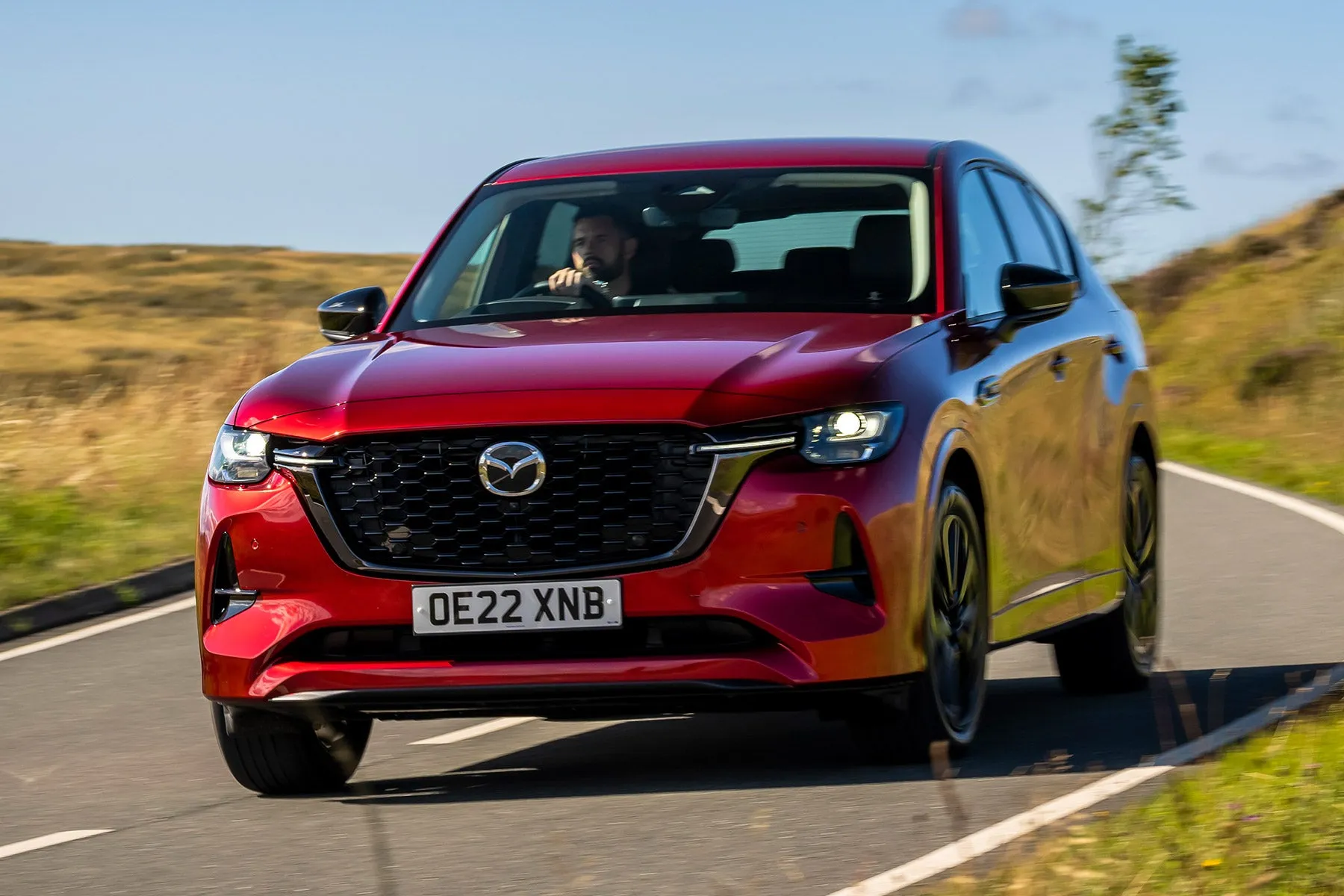
For many, plug-in hybrids (also known as PHEVs) are the perfect stepping stone to electric cars, allowing you to drive about day-to-day without using a drop of petrol, while giving you the ability to hit the road for long-distance trips at the weekend. This all plays into the hands of the Mazda CX-60, which comes as either a petrol-electric PHEV or you can have it with a more traditional diesel, though this takes a typically idiosyncratic Mazda approach.
The Mazda CX-60 squares up against premium competitors like the Audi Q5, BMW X3, Mercedes GLC, Lexus NX and Volvo XC60 - all of which are pretty firmly rooted in the market and do a pretty good job of catering for buyers who want a posh PHEV.
With a start price of around £45,000 (for PHEV or diesel) and generous equipment levels across the range, the Mazda CX-60 undercuts the premium stalwarts in terms of price. It's not the only plug-in hybrid SUV available at this level, though - you might also be looking at PHEV derivatives of the Hyundai Tucson, Toyota RAV4, Ford Kuga, Peugeot 3008 and Citroen C5 Aircross to name a few.
Of course, being a Mazda, the CX-60 does a few things a little differently. For a start, the CX-60's electric motor is combined with a larger than is usual for the class 2.5-litre naturally-aspirated petrol engine. This remains true to Mazda's 'right sizing' strategy - essentially, a big car needs a big engine. Going down the smaller turbocharged route might look impressive on paper, but it's not ideal for real-world fuel economy or long-term reliability, says the manufacturer.
That also explains with the CX-60 is offered with a six-cylinder 3.3-litre turbodiesel engine. In today's world, that is a huge motor for this sector, but it's creamily smooth power is aided by mild hybrid help to offer good economy and a 2500kg towing capacity that will appeal to some. There is a lower power 200PS version of the diesel with front-wheel drive only, but most will opt for the punchier 254PS version with all-wheel drive as emissions and economy are barely any worse.
The plug-in hybrid has an identical towing limit coupled to an EV driving range of up to 33 miles, while it can be charged from 10- to 80% in an hour and a half using a 7kW home wallbox. A three-pin plug will top it up in less than five hours, which will be more than sufficient for overnight charging.
As with a lot of plug-in hybrids, the Mazda CX-60 is at its most amiable when fully charged. It actually feels quite quick, which is amusing in an SUV of this size, but it lacks the refinement of premium German competitors. The automatic gearbox gets a bit flustered when the engine is required to kick in and, while the CX-60 handles well, its heavy weight means it's not as composed as the smaller Mazda CX-5.
While the engine choices might be a tad controversial, few people will disagree over the interior. It's lovely. There are just three trim levels available (Exclusive-Line, Homura and Takumi), with all three getting things like leather seats, a user-friendly infotainment system and a reversing camera. There isn't much reason to look for pricier models, although the top-spec Mazda CX-60 Takumi feels pretty special for its sub-£50,000 price tag in PHEV form.
The Mazda CX-60 is a large SUV but it's not actually that much bigger than the CX-5. That means you can't carry up to seven people in the CX-60, while its boot is spacious enough but not in the same league as a five-seat Skoda Kodiaq's. Drop the third row seats down in the Mazda, though and it's right up there for luggage capacity with the biggest and best. The interior feels roomy, with those in the front in particular enjoying a lofty seating position and plenty of useful storage areas.
If you're in the market for a stylish large SUV that won't cost a fortune to buy a run, the Mazda CX-60 is a desirable left-field alternative to premium competitors. There are more refined alternatives on the market while Mazda's hybrid-heavy approach won't suit every buyer, but we'd take a CX-60 over established models like the Toyota RAV4 PHEV and Ford Kuga PHEV.
Looking for a used car for sale? We've got 100s of Mazda Approved Used Cars for Sale for you to choose from, including a wide range of Mazda CX-60 cars for sale.
Is the Mazda CX-60 right for you?
If a plug-in hybrid suits your requirements (i.e. you cover a combination of short and long journeys and can charge a car at home), the Mazda CX-60 is a very appealing SUV. It's great to look at and has a very impressive interior, even if it's not quite as versatile as conventional (and less aspirational) family SUVs like the Volkswagen Tiguan Allspace.
The diesel CX-60 is harder to justify unless you really are wedded to this fuel.
What’s the best Mazda CX-60 model/engine to choose?
The majority of Mazda CX-60 buyers will go for plug-in hybrid power, especially if it's a company car deal.
All Mazda CX-60 models are well-equipped, so there isn't necessarily any justification to spend the extra cash on a Homura or Takumi model unless you just like the plush finishes. Standard equipment on the Mazda CX-60 Exclusive-Line includes black leather seats, a heated steering wheel and a 12.3-inch nav system as well as 18-inch alloy wheels, LED headlights and a reversing camera.
What other cars are similar to the Mazda CX-60?
The Mazda CX-60 is locking horns with premium SUVs - notably plug-in hybrid versions of the Audi Q5, BMW X3, Mercedes GLC, Lexus NX and Volvo XC60 to name a few. Badge snobs won't understand the attraction of the CX-60 but it's certainly as impressive as premium alternatives in terms of interior quality, while even top-spec models are relatively affordable.
More mainstream competitors include the Ford Kuga, Toyota RAV4 and Hyundai Sante Fe - all of which are available with plug-in hybrid power.
Comfort and design: Mazda CX-60 interior
"Any doubts about the Mazda CX-60's positioning against Audi or BMW alternatives will be laid to rest when you take a seat inside. It feels big and posh, with soft-touch materials aplenty and one of the slickest infotainment systems on the market."

The top-spec Mazda CX-60 Takumi feels particularly special, thanks to its fancy white nappa leather seats, maple wood centre console and grey fabric-covered dashboard.
That's not to say lesser models feel compromised, though; even the most affordable Mazda CX-60 Exclusive-Line comes with leather seats, a 12.3-inch digital driver's display and a windscreen-projected head-up display. Only the manual seat adjustment really gives it away as an entry-level model. That said, it does seem odd that wireless phone charging is an option across the range and not standard in all models.
The CX-60's seating position feels high, providing a good view of your surroundings and giving you a feeling of superiority that you don't get in smaller SUVs. The seats are big and wide, as is the centre console separating the driver from the front-seat passenger. CX-60 Homura and Takumi trim levels come with Mazda's Driver Personalisation System which recognises your face and adjusts the positioning of the seat, head-up display, door mirrors and steering wheel to your requirements.
While other manufacturers are chasing minimalism in their cabins, the CX-60's interior is quite button-heavy. That's a good thing in our view - it doesn't detract from the premium vibe, but does mean you can change the temperature of the climate control or turn on the heated seats with little faff. The same can't be said for a lot of modern SUVs. It also comes with one of the best infotainment systems on the market, operated by a rotary controller rather than relying on a touchscreen.
Quality and finish
You'll struggle to find fault with the Mazda CX-60's interior finish, particularly if you're comparing it alongside a Ford Kuga or Toyota RAV4. From the satisfyingly clunky buttons to the soft-touch dashboard, the CX-60 feels every bit the premium product - just as well, considering it has the excellent BMW X3 and Volvo XC60 in its sights.
Infotainment: Touchscreen, USB, nav and stereo in the Mazda CX-60
We've long been fans of the way Mazda goes about providing infotainment and the CX-60 doesn't disappoint here. The 12.3-inch widescreen infotainment screen isn't the focus of the cabin, but it is handily positioned high up the dashboard - so you can glance at it on the move without it being too much of a distraction.
The digital display is controlled using a physical control on the centre console, which is intuitive to use and feels much less clumsy (and potentially dangerous) than trying to use a touchscreen display on the move.
The graphics are sharp and the menus are easy to operate, while all Mazda CX-60 trim levels come with wireless Apple CarPlay and Android Auto. That means you can connect your phone to the car and access third-party apps like Google Maps and Spotify through the digital infotainment system.
Pleasingly, Mazda shuns the minimalist approach to interiors so, as well as the rotary controller for navigating the infotainment system, you also get old-school knobs and buttons for adjusting the climate control or cranking up the volume. As well as being sensibly laid out, these look neat and unfussy, while feeling pretty posh to use (if a button can feel posh...).
All Mazda CX-60 models come with a sharp 12.3-inch digital instrument cluster which is fuss-free, although not as configurable as, say, Audi's Virtual Cockpit. Music fans might want to look for a CX-60 Homura or Takumi as these come with a fancy 12-speaker Bose surround-sound system which sounds pretty impressive to our untrained ears.
Space and practicality: Mazda CX-60 boot space
The Mazda CX-60 comes with a fairly big 570-litre boot (again, it only just has the edge over the CX-5's 522-litres). Access is aided by a hands-free electric tailgate, with a wide opening providing easy access. The boot's a relatively square shape, too, so packing it for a family holiday shouldn't be too much of a chore. If you need more space, the rear seats can be dropped using levers in the boot. This increases boot space to a pretty huge 1726-litres.
While the second row rear seats can't slide backwards and forwards, they can be reclined between two positions. There's plenty of space for adults back there, although the middle rear seat is considerably narrower than the outer ones. Carrying three in the back of the Mazda CX-60 isn't something you'll want to do on a regular basis. Still, there's room for two adults, with plenty of head and knee room (the former is marginally impacted by the optional panoramic sunroof). You can also order the CX-60 as a six-seater as a no-cost option with three pairs of captions chairs.
Those in the front will have little to complain about in terms of space on offer in the Mazda CX-60. You sit high up with big, supportive seats providing plenty of cushioning for longer journeys. A wide centre console provides a generous amount of space between the front seats, while there's the usual mix of cup holders, door bins and glovebox cubbies for stowing away your odds and ends.
The Mazda CX-60 is the brand's biggest car in the UK, measuring 4745mm in length, 1890mm in width (2134mm including door mirrors) and 1675mm in height. Those dimensions aren't a huge amount bigger than the Mazda CX-5, though, and - unlike, say, a Skoda Kodiaq - you can't get a seven-seat Mazda CX-60.
Handling and ride quality: What is the Mazda CX-60 like to drive?
"Mazda has form for creating some of the most dynamically pleasing cars in their sector. There's only so much you can do to make a big, heavy hybrid SUV handle well, though - and while the CX-60 is no less agile than rivals, the smaller Mazda CX-5 feels more composed during day-to-day driving."
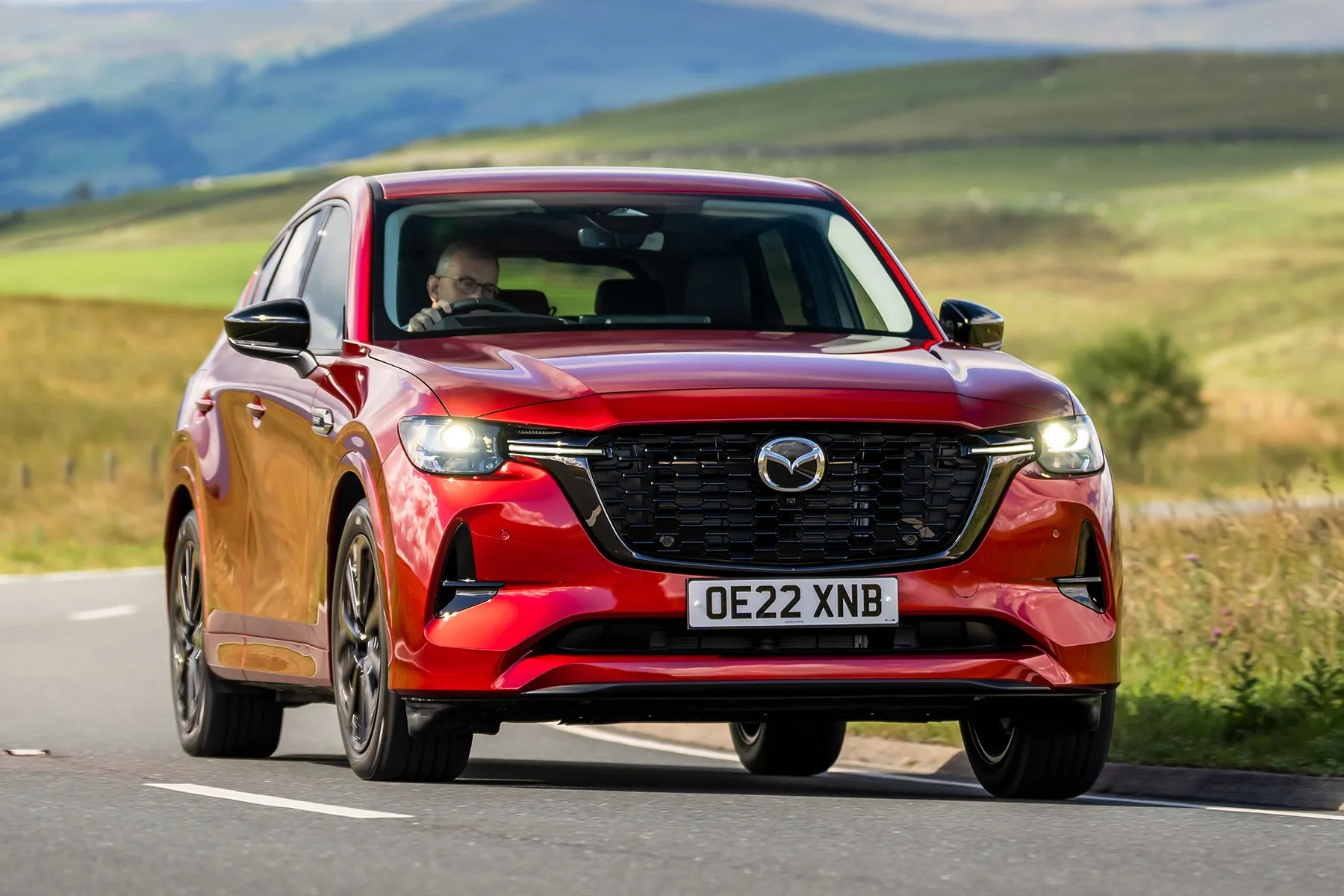
The CX-60 is different from the CX-5 because the latter is a front-wheel drive car made four-wheel drive, while the former drives more like a rear-wheel drive car at its heart (although the PHEV and more potent diesel are four-wheel drive). In that way it's similar to the BMW X3 and Mercedes-Benz GLC, in theory offering a more sporting approach.
True to Mazda form, you get sharp, communicative steering which will appeal to buyers trading in their MX-5 sports cars for a family SUV. It doesn't roll about too much in the bends, either, but that does come at the expense of ride quality. The PHEV batteries mean it's quite a heavy SUV so it does thump a bit over broken road surfaces, especially when specced with the larger 20-inch alloy wheels. The diesel is smoother in this respect but pitches more in corners.
Unfortunately for the Mazda, there are no shortage of family SUVs that are great to drive. We reckon the BMW X3 strikes a near-perfect balance of comfort and agility, while the Ford Kuga feels just as sharp as the CX-60. The CX-60 is much more entertaining than the pretty staid Toyota RAV4 or Hyundai Santa Fe, though, and it'll be interesting to see if the lighter petrol and diesel models impress more.
Forward visibility is excellent, but the Mazda CX-60 feels its size when you attempt to reverse it into a tight parking space. Fortunately tech is your friend here... all CX-60 models come with a high-resolution reversing camera as standard as well as parking sensors for the front and rear. Simple things like chunky door mirrors come in handy, too, while the Rear Cross Traffic Brake system (available as part of the optional Driver Assistance Pack) will apply the brakes if it detects a potential collision when you're reversing out of a space.
What engines and gearboxes are available in the Mazda CX-60?
The Mazda CX-60 comes with plug-in hybrid power. It's the brand's first PHEV, combining a 2.5-litre petrol engine with an electric motor to power to all four wheels. In total, the Mazda CX-60 PHEV produces 327PS and a fairly significant 500Nm of torque. As a result, it feels quick for an SUV of this size, the electric motor providing urgent acceleration off the line. Officially, it'll sprint to 62mph in just 5.8 seconds - quicker than a BMW X3 xDrive30e or Lexus NX450h+.
There are two diesel options on the Mazda table - a rear-drive only with a 200PS version of the 3.3D mild hybrid motor, or a 254PS version that comes with four-wheel drive. We've only driven the all-wheel drive model, which is smooth and refined, but the ride is not as polished as we'd like.
Both Mazda CX-60 models use an eight-speed automatic gearbox which transitions between gears cleanly enough, while the petrol engine kicks in and out relatively smoothly when necessary. It's not seamless, though - you might notice the occasional jerk as the petrol and electric motors attempt to work together.
As with most PHEVs, the Mazda CX-60 is at its most pleasant with a fully-charged battery. Even in electric mode, though, it makes a surprising amount of whirring and whooshing noises.
Refinement and noise levels
If you're expecting electric car refinement from the plug-in hybrid Mazda CX-60, you might be in for a bit of a shock. The petrol engine sounds almost sporty (although it isn't the smoothest in reality) under acceleration, while even when running around under electric power it's far from quiet. There's a distinctive drone from the electric motor, while the chunky alloy wheels of our test car transfer a significant amount of road noise into the cabin.
The diesel is the much quieter when cruising and even when worked hard it emits a pleasing six-cylinder hum. Little tyre or wind noise can be heard in either version of the CX-60.
Safety equipment: How safe is the Mazda CX-60?
No matter which trim level you go for, the Mazda CX-60 should feel like a safe family SUV. The sheer size of the CX-60 plus its lofty seating position means you feel anything but vulnerable on the road. It comes with an extensive list of driver-assist and safety systems, too, including a Hill Decent Control system (which controls the car's speed when descending a steep or slippery slope) as well as a Driver Attention Alert feature which pings when you're not paying as much attention as you should be.
For the ultimate suite of driver-assistance tech, you'll need a CX-60 with the optional Convenience and Driver Assistance Pack. This adds adaptive LED headlights, Front Cross Traffic Alert, Rear Cross Traffic Brake, Rear Smart City Brake Support, radar cruise control and a towing mode. It also come with a 360-degree parking monitor.
The Mazda CX-60 was awarded five stars for safety when it was crash-tested by Euro NCAP in 2022.
MPG and fuel costs: What does a Mazda CX-60 cost to run?
"Mazda reckons the CX-60 PHEV can travel 39 miles under electric power alone at up to 62mph. That'll make the Mazda CX-60 very cheap to run, provided you keep the battery topped up."
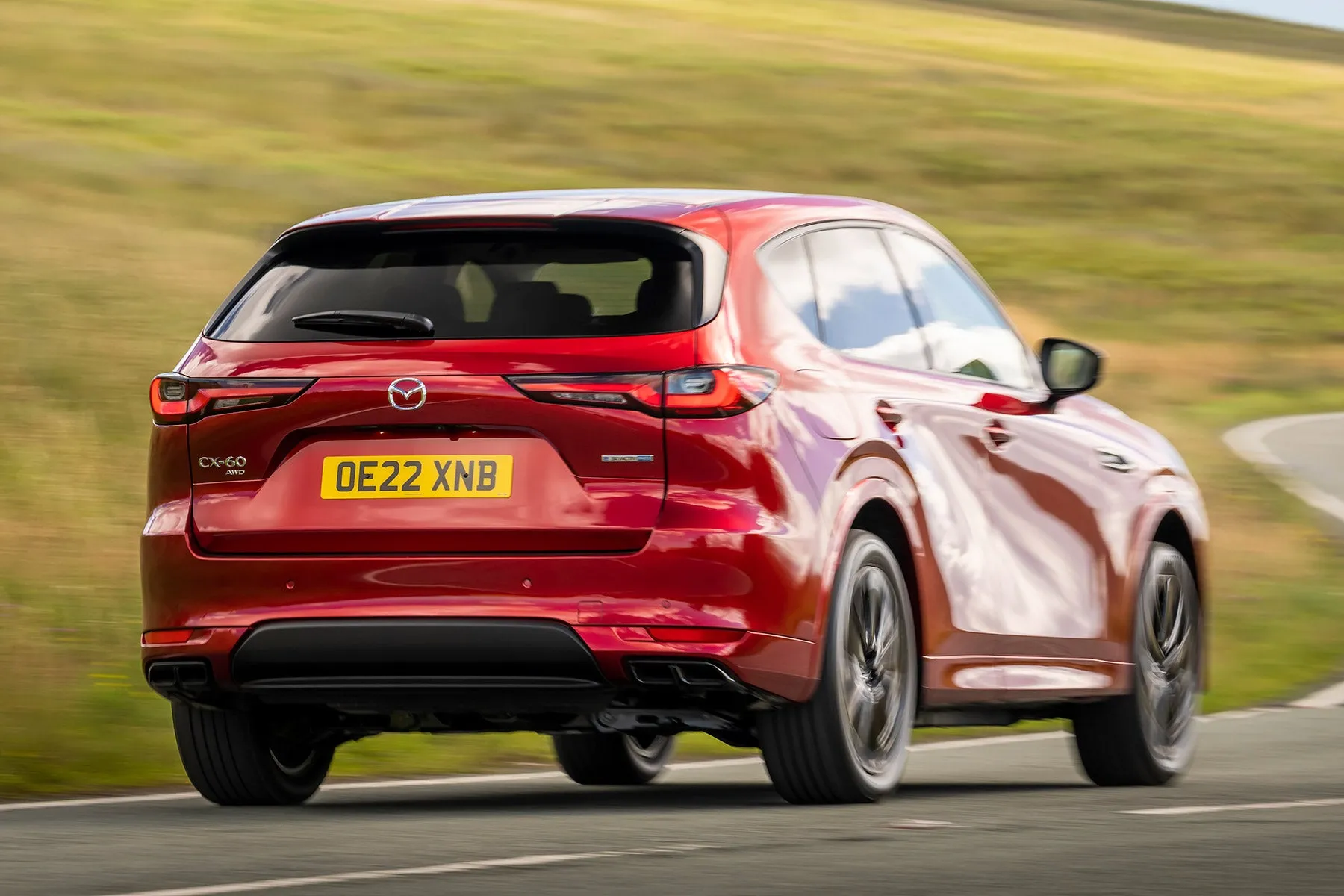
Our time with the plug-in hybrid Mazda CX-60 suggests these figures are relatively realistic but, as is always the case, the real-world range depends on a wide variety of factors (including how heavy you are with the accelerator, the outside temperature and even how many electrical devices you're running inside the car).
With a 17.8kWh battery, you'll pay less than a tenner to fully charge the Mazda CX-60 PHEV. Officially, the Mazda CX-60 PHEV returns 201.8mpg but you'll have to charge it regularly to see anywhere near this. Once the battery's flat, it'll act like a normal hybrid (albeit one with a big, heavy battery), so it'll be more efficient than a regular petrol SUV but still perform a long way off the quoted figure.
With the diesel, the best it claims is 55.4mpg for the front-drive 200PS model. Take the all-wheel drive version with its 254PS motor and that drops only slightly to 51.4mpg.
Mazda CX-60 reliability and warranty
While the Mazda CX-60 is obviously still very new, the brand has a strong reliability record. The plug-in hybrid powertrain is unproven technology but Mazda routinely pushes the boundaries in terms of mechanicals and it's rare that its cars are anything less than dependable.
The only blot on Mazda's copybook in recent years have been its diesel engines which haven't always been entirely faultless, especially if used for regular short journeys. That shouldn't be an issue with the CX-60 PHEV, though.
Mazda CX-60 insurance groups and costs
Mazda CX-60 Exclusive-Line models are in insurance group 33 for the front-drive 200PS diesel, while the four-wheel drive diesel version nudges up to group 38, as are the rest of the diesel-powered trims. Take the PHEV in this trim and it's also in group 38.
The Homura and Takumi with PHEV power are in insurance group 39. That means the Mazda CX-60 is reasonable to insure. It shouldn't be any pricier than other premium plug-in hybrid SUV alternatives, but it's always worth shopping around for quotes.
VED car tax: What is the annual road tax on a Mazda CX-60?
The plug-in hybrid Mazda CX-60 emits 32g/km of carbon dioxide emissions, so from April 2025 its first-year road tax bill will be £110. However, you will also have to add on £425 that is charged for cars costing more than £40,000 new, and this applies till the car passes the five-year old mark. Road tax, at least, drops to £195 when the CX-60 reaches a year old.
Looking to the diesel model, the 200PS version produces 132g/km so pays £540 for the first year's road tax before defaulting to the £195 annual payment. The four-wheel drive model emits between 139- and 142g/km depending on trim, so pays the same - and both have the £425 added levy to pay thanks to their £40,000-plus price tag when new.
Mazda CX-60 price
"The Mazda CX-60 costs from a little more than £45,000 for the PHEV in Exclusive-Line trims. The brand isn't shy of its premium aspirations for the CX-60 - but that's still significantly cheaper than rivals like the BMW X3 xDrive30e and Volvo XC60 Recharge."
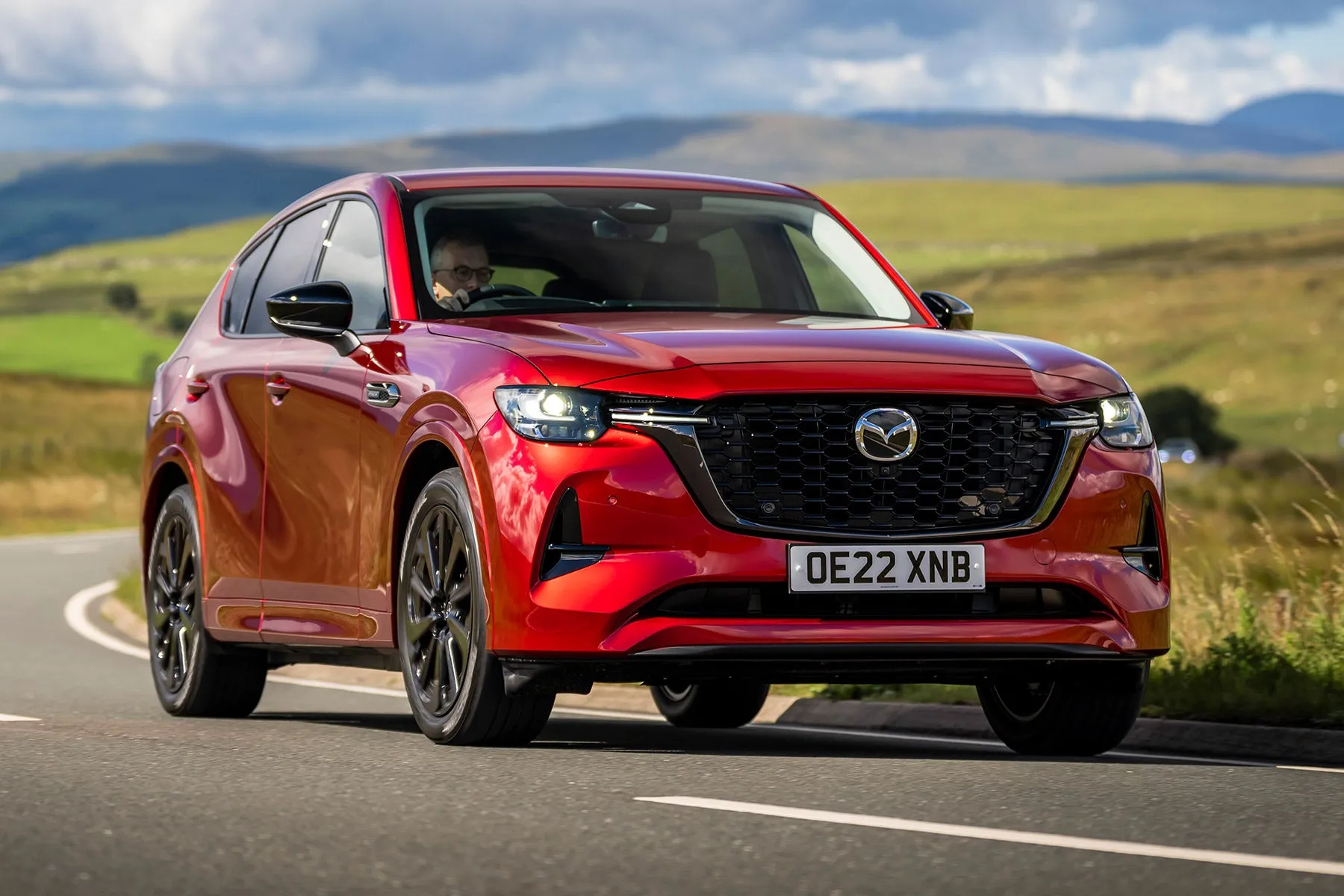
The mid-spec Mazda CX-60 Homura starts from a tad over £48,000, while the top-of-the-range Mazda CX-60 Takumi is around £49,500 - meaning you can pick up a fully-loaded model for less than premium alternatives.
A diesel CX-60 costs from a whisker over £45,000 for the 200PS model. All-wheel drive CX-60s with the 254PS diesel begin at just shy of £48,000 and rise to as much as almost £55,000.
Trim levels and standard equipment
The Mazda CX-60 is available in three core specifications: Exclusive-Line, Homura and Takumi.
The entry-level Mazda CX-60 Exclusive-Line is well kitted out, with standard equipment including 18-inch alloy wheels, LED headlights (dusk-sensing with high-beam control), a reversing camera, front/rear parking sensors and rain-sensing windscreen wipers. Inside, the CX-60 Exclusive-Line features black leather seats, a 12.3-inch digital instrument cluster, heated seats, a heated leather steering wheel and an electronic parking brake.
Infotainment in the Mazda CX-60 Exclusive-Line is taken care of with a 12.3-inch navigation system (with Apple CarPlay and Android Auto). Cruise control is standard, as well as dual-zone climate control and a windscreen-project driver's display. Standard safety equipment includes Blind Spot Monitoring with Rear Cross Traffic Alert, Driver Attention Alert, Intelligent Speed Assist, Lane-keep Assist System with Lane Departure Warning System, Smart Brake Support, keyless entry and Traffic Sign Recognition. However, wireless phone charging is an optional extra on all CX-60s, which is an anomaly in our book.
The distinctive Mazda CX-60 Homura adds 20-inch black alloy wheels and gloss black exterior highlights. Inside, the Homura features ambient lighting, electric driver and front passenger seat adjustment, electric steering wheel adjustment, ventilated front seats and heated outer rear seats. The mid-spec model also features Mazda's Driver Personalisation System as well as a 12-speaker Bose surround sound system.
Topping the range, the Mazda CX-60 Takumi builds on Homura spec with 20-inch black metallic machined alloy wheels, body coloured door mirrors and a side window chrome surround. Changes are more noticeable inside, where the CX-60 Takumi features white Nappa leather seat trim, a white maple wood console panel, a cloth detailed stitching dashboard panel and a bright decoration panel.
While the Mazda CX-60 isn't offered with a long list of individual options, there are a number of key option packs available. These include the Comfort Pack which is available on the CX-60 Exclusive-Line (adding 20-inch alloy wheels, Driver Monitoring, electric seat adjustment, ventilated front seats and heated outer rear seats).
The Convenience Driver and Assistance Pack is available across the range, adding front and rear courtesy lamps, AC sockets, a 360-degree parking camera, privacy glass and wireless phone charging. It also features adaptive LED headlights, Front Cross Traffic Alert, i-Adaptive Cruise Control, Radar Cruise Control, Rear Cross Traffic Brake and SMart Brake Support - Rear.
Ask the heycar experts: common questions
Is the Mazda CX-60 bigger than the CX-5?
Is the Mazda CX-60 a hybrid?
What is the Mazda CX-60?
Get our latest advice, news and offers
Keep me updated by email with the latest advice, news and offers from heycar.
By submitting you agree to our privacy policy
